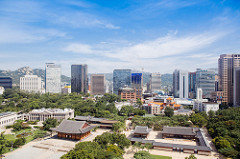Korea Embracing Plastic Surgery Norms Through ‘Medical Tourism’ Posted by Tony Kitchen on May 21, 2015
South Korea has been pushing efforts both privately and through government agencies to increase tourism to the ROK in the non-traditional form: medical tourism. In 2014, about 56,000 Chinese alone visited South Korea for plastic surgery, according to China’s Ministry of Health, up from 4,700 in 2009. The social norm in Korea (as well-documented as ever…
Learn Korean “If” and “When” Posted by Soo on May 18, 2015
Some of my students were confused using “If/(으)면” and “when/(을)ㄹ 때” because they can be used in the similar situation. For instance, when you go to the store, please buy me a coke. If you go the store, please buy me a coke. Can you classify what is different between two sentences? We all know…
Busan Cave Bar’s Makgeolli, Dongdongju Is Korea’s Best City Escape Posted by Tony Kitchen on May 16, 2015
Hidden to even Busan natives, “Dragon Dream” (용꿈) is a makgeolli (막걸리) bar with two twists: a former World War II Japanese bomb shelter carved into the mountain during the colonization of Korea, and a unique version of makgeolli called dongdongju (동동주). The cave (동굴) drips with water seeping through the rock, calcium deposits growing…
Learn Korean “Whether (or not)” Posted by Soo on May 11, 2015

“Whether (or not)” is high frequency you need to learn in Korean. The grammar rule is v.s. + (ㄴ/은)지 for present. For instance, I don’t know whether you like it/ 나는 네가 그것을 좋아하는지 모르겠다: 좋아하다 is action verb, so need to add 는지 =좋아하는지. Remember when there is 하다 at the end of verb…
Bourdain’s Survival Drinking in Korea: Customs, Expectations, and Beyond Soju Posted by Tony Kitchen on May 9, 2015
Late last month, Anthony Bourdain made headlines by opening the fifth season of “Anthony Bourdain Parts Unknown” with a trip to South Korea, a country whose social habits bind tightly with drinking and eating and eating and more drinking. About Korea’s social life, Bourdain said, “Everything you learned, painfully, in college about drinking–don’t mix, try to…
Learn Korean “Only” #3 Posted by Soo on May 6, 2015

Today you will learn the last meaning of “Only” in Korea I prepared for you. This is very high frequency Korean use when they want to express in negative way. In positive way, they will say I only need potatoes/감자만 필요해요, but in negative way I only have potatoes/감자 밖에 없어. The grammar is “Noun…
A Night in a Korean Bathhouse Posted by sasha on Apr 29, 2015
On both of my visits to South Korea, one of the highlights was spending a night in a traditional Korean bathhouse. Known as jimjilbang (찜질방), these are extremely popular with people of all ages and they represent an important aspect of Korean culture. Unlike spas back home in the States where you’re totally secluded, a…


